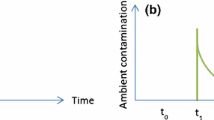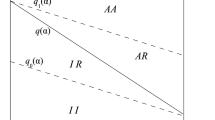Abstract
This paper focuses on the issue of optimal pollution control when either pollution itself is irreversible or when some characteristic of the environmental resource is irreversibly destroyed in the course of growing pollution. It is shown that exhausting the assimilative capacity through too heavy pollution is never optimal unless the rate of social time preference is sufficiently high. The paper also investigates the case that decisions about irreversible developments have to be made under uncertainty today when the decision maker faces the prospect of better information about the irreversible damage at some future point in time. A non-negative quasi-option value is shown to exist as in the Arrow-Fisher-Henry model that relates to natural resource deletion by projects of industrial development.
Similar content being viewed by others
References
K.J. Arrow and A.C. Fisher, Environmental preservation, uncertainty, and irreversibility, Quart. J. Econ. 88(1974)312–319.
R.C. Bishop, Resource valuation under uncertainty: Theoretical principles for empirical research, in:Risk, Uncertainty, and the Valuation of Benefits and Costs, ed. V.K. Smith (JAI Press, Greenwich CT, 1986) pp. 133–152.
P. Dasgupta, G. Heal and M. Majumdar, Resource depletion and research and development, in:Frontiers of Quantitative Economics, vol. 3B, ed. M.D. Intrilligator (Amsterdam, 1976).
H.R. Clarke and W.J. Reed, Land development and wilderness conservation policies under uncertainty. A synthesis, Manuscript, Department of Economics, La Trobe University (1988).
K. Fiedler, Naturwissenschaftliche Grundlagen natürlicher Selbstreinigungsprozesse in Wasserressourcen, Zeits. Umweltpolitik und Umweltrecht (1994).
A.C. Fisher and W.M. Hanemann, Option value and the extinction of species, in:Risk, Uncertainty, and the Valuation of Benefits and Costs, ed. V.K. Smith (JAI Press, Greenwich, CT, 1986) pp. 169–190.
A.M. Freeman III, Uncertainty and environmental policy: The role of option and quasi-option values, in:Risk, Uncertainty, and the Valuation of Benefits and Costs, ed. V.K. Smith (JAI Press, Greenwich, CT, 1986) pp. 153–167.
X. Freixas and J.-J. Laffont, On the irreversibility effect, in:Bayesian Models in Economic Theory, ed. M. Boyer and R.E. Kiehlstrom (Elsevier Science, Amsterdam, 1984) pp. 105–114.
C. Henry, Option values in the economics of irreplaceable assets,The Review of Economic Studies, Symp. on the Economics of Exhaustible Resources (1974) pp. 89–104.
D.H. Jacobson, M.M. Lele and J.L. Speyer, New necessary conditions of optimality for control problems with state-dependent inequality constraints, J. Math. Anal. Appl. 35(1971)255–284.
M.I. Kamien and N.L. Schwartz, Optimal exhaustible resource depletion with endogenous technical change, Rev. Econ. Studies 45(1978)179–196.
E. Keeler, M. Spence and R. Zeckhauser, The optimal control of pollution, J. Econ. Theory 4(1971)19–34.
J.V. Krutilla and C.J. Cicchetti, Evaluating benefits of environmental resources with special application to the Hell's Canyon, Natural Resources J. 12(1972)1–29.
K.-G. Mäler, Critical loads and international environmental cooperation, in:Conflicts and Cooperation in Managing Environmental Resources, ed. R. Pethig (Springer, Berlin/Heidelberg, 1992) pp. 71–83.
J. Miller and F. Lad, Flexibility, learning, and irreversibility in environmental decisions: A Bayesian approach, J. Env. Econ. Manag. 11(1984)161–172.
R. Pethig,Umweltökonomische Allokation mit Emissionssteuern (J.C.B. Mohr (Paul Siebeck), Tübingen, 1979).
R. Pethig, Problems of irreversibility in the control of persistent pollutants, in:Persistent Pollutants: Economics and Policy, ed. H. Opschoor and D.W. Pearce (Kluwer, Dordrecht, 1991) pp. 93–103.
R. Pethig, Ecological dynamics and the valuation of environmental change, in:Valuing the Environment: Methodological and Measurement Issues, ed. R. Pethig (Kluwer, Dordrecht, 1994) pp. 3–21.
F. van der Ploeg and C. Withagen, Pollution control and the Ramsey problem, Env. Resource Econ. 1(1991)215–236.
R.S. Pindyck, Irreversibility, uncertainty and investment, J. Econ. Literature 29(1991)1110–1148.
H.-W. Sinn, The economic theory of species extinction: Comment on Smith, J. Env. Econ. Manag. 9(1982)194–198.
V.L. Smith, Control theory applied to natural and environmental resources. An exposition, J. Env. Econ. Manag. 4(1977)1–24.
D.A. Starrett, Fundamental nonconvexities in the theory of externalities, J. Econ. Theory 4(1972)180–199.
R. Svento, Welfare measurement under uncertainty, in:Valuing the Environment: Methodological and Measurement Issues, ed. R. Pethig (Kluwer, Dordrecht, 1994) pp. 129–150.
B.A. Weisbrod, Collective-consumption services of individual-consumption goods, Quart. J. Econ. 78(1964)471–477.
Author information
Authors and Affiliations
Rights and permissions
About this article
Cite this article
Pethig, R. Optimal pollution control, irreversibilities, and the value of future information. Ann Oper Res 54, 217–235 (1994). https://doi.org/10.1007/BF02031735
Issue Date:
DOI: https://doi.org/10.1007/BF02031735




